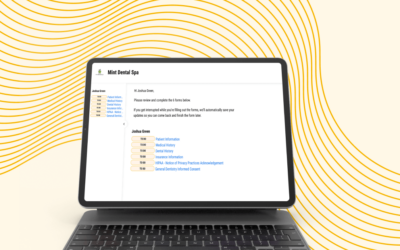
Dental practices must comply with specific regulations regarding their operations, handling of patient records, and maintaining sensitive data. When transitioning to a paperless dental office, you must comply with all applicable data privacy laws.
In addition, you must look at laws like Health Insurance Portability and Accountability Act (HIPAA), employment laws, and other international privacy laws like the General Data Protection Regulation (GDPR).
Failing to comply with these laws can carry various penalties, including fines and potential lawsuits, adversely impacting your practice’s reputation. Therefore, it is essential to prioritize paperless dental office compliance with all applicable laws.
This article will explain why paperless dental offices must stay compliant and the potential impact of non-compliance.
What is a Paperless Dental Office?
A paperless dental office is a practice that operates with minimal paper and embraces technology to streamline operations. It does not use paper records for patient information. Instead, it relies on Electronic Health Records (EHRs), Practice Management Systems (PMSs), and automated appointment scheduling solutions.
Paperless offices help dentists save time by automating tedious tasks, improving records’ accuracy, and easing collaboration. However, paperless offices also require practicing within compliance guidelines.
To ensure paperless dental office compliance, dentists must properly store and secure PHI (Protected Health Information) according to HIPAA regulations.
Additionally, paperless dental practices must meet global data privacy regulations and cybersecurity standards.
The American Dental Association (ADA) has also published a bulletin to increase awareness about cybersecurity issues affecting dental practices and tips to handle them.
To comply with these regulations, paperless dental offices must meet the infrastructure and technology requirements. In addition, they must protect patient information while delivering top-notch patient care.
What are the Potential Compliance Issues When Going Paperless?
The potential compliance issues for paperless dental offices vary depending on the regulatory and legal requirements of a particular state or country.
However, some common issues to consider when ensuring compliance in paperless dental offices include the following:
- Ensuring Data Security and Patient Privacy: Data privacy regulations like HIPAA and GDPR require dentists to protect the confidentiality of their patient’s health information. Paperless systems must be able to store patient medical records to meet these standards securely.
- Complying with Recordkeeping Regulations: Some states require all healthcare providers to keep comprehensive patient records for several years. Therefore, dental practices must ensure they have adequate technology and staff trained in proper document storage procedures to comply with these laws.
- Eliminating Data Errors: Dentists must update patient records with changes in their health information, such as new medications or allergies. You can prevent medical errors due to outdated data entry. Inaccurate medical records may lead to potential litigation. Keeping records up to date helps reduce diagnostic and treatment mistakes.
- Prevent Unauthorized Access: Dental practices must ensure that their electronic records are secure from data breaches. Paperless systems should employ robust encryption protocols and allow multiple levels of user authentication to meet security requirements.
Paperless dental offices must stay updated with compliance regulations to maintain a secure patient data environment.
Dental practitioners must also take the required steps to ensure data compliance, from investing in robust security solutions to reducing vulnerabilities to establishing clear policies for data management.
You must establish clear policies and procedures to keep your paperless dental office compliant with the following legal requirements:
-
HIPAA
The Health Insurance Portability and Accountability Act (HIPAA) is a set of rules enacted to ensure the privacy, integrity, and security of personal health information in the United States.
Dental practices collect sensitive patient data such as medical history, demographic information, billing records, and payment information. Therefore, HIPAA compliance for dental offices is crucial to maintain the trust of their patients and safeguard their private data.
It includes implementing proper policies and procedures regarding access control, employee training on PHI (Protected Health Information), and setting up secure networks/systems to store patient data.
In addition, dentists should also be aware of what disclosures are allowed under HIPAA guidelines and how to handle data breach situations.
Dentists should always ensure that patient information remains confidential when communicating with other healthcare providers or third-party payers via fax, email, or phone calls.
-
International and Local Privacy Laws
Dental practices are subject to various laws and regulations related to advertising, seeking patient consent, and maintaining the confidentiality of patient records. These laws vary across geographies. Therefore, dentists need to be aware of local laws and regulations in the region. You should also consider any international laws that might affect your operations.
Dentists should ensure a well-structured system to comply with all applicable international and local privacy laws.
Additionally, regular security audits should be conducted to ensure that all systems are up-to-date and secure from potential threats.
In a paperless dental office, patient information is stored on electronic systems. Therefore, complete confidentiality must be ensured when storing and managing it. Data encryption is a powerful tool for protecting sensitive information.
Dental offices should use encrypted communication protocols such as Transport Layer Security (TLS) and Secure Sockets Layer (SSL) to minimize the risk of unauthorized access to patient data.
Physical security measures such as locks and password protections are essential for safeguarding sensitive patient records.
-
Employment Laws
Most dental offices employ hygienists, assistants, and support staff. Therefore, the employer must know the guidelines that support and protect the employees.
Dentists need to understand the employment laws that impact the classification, eligibility, duties, leaves, compensation, and rights of dental staff.
In addition, you must also ensure compliance with the minimum wages, overtime rules, and local ordinances that may extend additional protections to workers.
You must also be mindful of employment laws, such as:
- Occupational Safety and Health Act (OSHA) sets standards to protect workers from hazardous working conditions.
- Americans with Disabilities Act (ADA) prohibits discrimination against individuals with disabilities.
- Family and Medical Leave Act (FMLA) provides employees with up to 12 weeks of unpaid job-protected leave for qualifying medical or family reasons.
- Fair Labor Standards Act (FLSA) sets the minimum wage per hour for non-exempt employees and requires employers to keep accurate records of work hours.
Additionally, you must focus on meal and rest periods, vacation entitlements, whistleblower protection, recordkeeping obligations, and payroll deductions to ensure better compliance.
A key component of compliance with employment law is understanding the various labor laws that protect workers from discrimination or unfair practices.
In a paperless dental office, it is essential to utilize digital solutions to track hours, calculate wages, and store documents securely.
-
Technology Compliance
Technology adoption drives the transition to a paperless clinic. However, it also introduces a new set of compliance issues and the need for up-to-date security protocols.
You must ensure your office computers, Patient Management Systems, digital solutions, and other technology systems are HIPAA compliant.
The protection of Electronic Protected Health Information (ePHI) through privacy and security measures and compliance with local healthcare regulations is mandatory. In addition, network and device encryption enables you to protect confidential patient information from unauthorized access.
Access control ensures that only authorized users can access the data. In addition, authentication systems are necessary for verifying user identities before allowing entry into the system.
Activity audits help review how dental staff interacts with patient health records daily. For example, automatic log-off ensures no one stays logged in after work hours or has access to the system.
Final Thoughts
Going paperless in your dental office provides an organized way to store and ensure the safety of confidential patient data. It allows you to access patient information quickly and accurately, saves time and money, and improves patient satisfaction.
As technology advances in the healthcare industry, implementing a paperless system is increasingly becoming a competitive advantage for a successful dental practice.
Yapi accelerates your dental practice’s transformation into an adequately compliant paperless dental office.
Yapi streamlines the operations of your dental office by:
- Automating patient scheduling and reminders
- Paperless dental patient in-take forms
- Electronic patient data collection
- Secure cloud-based storage
- Online payments
- Secure patient portals
Yapi offers a HIPAA and dental regulations-compliant paperless system that ensures a secure and efficient workflow for your practice. It is an all-in-one solution to eliminate tedious manual work.
Start your journey towards a paperless dental office today with Yapi!


